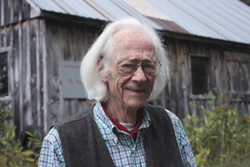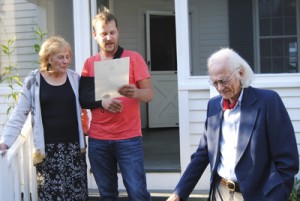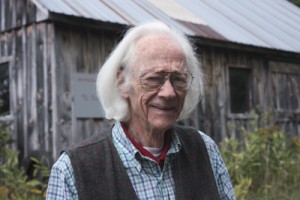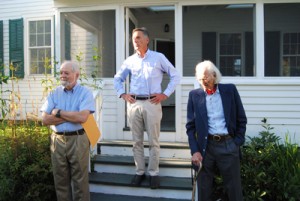

copyright the Chronicle September 10, 2014
by David Dudley
ALBANY — At 91 years of age, Francis Whitcomb has held any number of titles, formal and otherwise: Lister, moderator, planning commissioner, justice of the peace, chairman of the Orleans County Democratic Committee, teacher, principal, farmer, sugarmaker, singer, advisor, father, and husband, among many others.
Mr. Whitcomb tried to add state Representative to that list, but the title eluded him through seven campaigns.
Sitting at the head of the kitchen table in his old farmhouse in Albany Monday, Mr. Whitcomb had the air of a preacher. He’s tall and was dressed simply, as though he were going to spend the day in the garden, in the sugarhouse, or engaged in one of his favorite pastimes, walking.
When asked why he got into politics, Mr. Whitcomb gave pause.
His wife, Pat Whitcomb, was in the kitchen, canning tomatoes.
“In the early eighties, there was nobody running on the Democratic ticket,” Mr. Whitcomb said, finally. “There was no voice. So I thought I’d try.”
It came as no surprise to him that he lost. The Republican party, he said, was too entrenched in this part of the state. The Democrat, no matter who it was, was bound to lose.
“I knew, more or less, that I wasn’t going to win,” Mr. Whitcomb said. “But I loved the process. And the last time I ran, I got very close.
“Today, it’s almost equally divided between Republican and Democrat,” he added, with a hint of pride.
Mr. Whitcomb’s main political rival, Republican Bob Kinsey was also a dear friend. They sang side by side in the East Craftsbury Presbyterian Church choir. Both men sang in the bass section. When they met before rehearsals, Mr. Kinsey often greeted Mr. Whitcomb with news from the House.
“Our ideals weren’t all that different. We were both pushing for the same things, we just had different labels attached to our names.”
Mr. Whitcomb fondly recalls driving around the county, meeting people from all walks of life.

“It was good fun,” he said. “We joked about it all the time. It was a very interesting time in my life.”
One day, while knocking on doors, Mr. Whitcomb knocked upon the door of current state Senator John Rodgers of Glover, who asked him why he was running for office.
What Mr. Whitcomb felt he had to offer the community, as a leader elect, was perspective.
“What any candidate has to offer is who they are,” he said.
“Having been a school teacher for many years, I saw the results of many of society’s ills in the classroom. So many kids came from families who were truly impoverished, dysfunctional. Vermont’s problem, up here, has always been employment. I wanted to bring opportunities to the area, so that they’d have jobs when they graduated high school.”
Mr. Whitcomb himself was no stranger to hard work.
Before becoming a teacher, he worked in a factory in upstate New York. They made teaching models, little machines and devices that were used by the U.S. Navy. Though it was fascinating, Mr. Whitcomb grew weary of the commute and the repetitive nature of the work.
His need for new experiences pushed him toward education.
Mr. Whitcomb broke into teaching when a friend of his called with a job offer at the Hickory School in Putney. He accepted, but his new life as teacher was short lived. The schoolhouse where he worked burned down.
The Putney Graduate School had established itself in the community around the same time. The program was built on the principles of progressive education conceived by John Dewey, which taught students to value art, academics, physical work, and community.
“There I was, out of a job, and this looked like an interesting opportunity,” Mr. Whitcomb said. “I enrolled. There were six of us, all of different ages, and with different experiences, having taught in different areas throughout the area.”
The program was headed by Morris R. Mitchell, an imminent educator who brought to the program a perspective — namely that of an educator who had worked in the South — that Mr. Whitcomb came to appreciate.
It was at Putney that Mr. Whitcomb met George Shumlin, who would become a lifelong friend.
In 1952, Mr. Whitcomb met his wife to be, Pat. They married in 1953.
After completing another two years of graduate work in Michigan, Mr. and Mrs. Whitcomb were flat broke. They went to New Canaan, Connecticut, where Mr. Whitcomb had gotten another job teaching. They lived and worked there for the following four years.
They were happy, but Mr. Whitcomb got a call one day from his friend George Shumlin, who asked if he’d like to return to Putney, where Mr. Shumlin had established The Grammar School.

Mr. Whitcomb accepted. Though he was sad to leave New Canaan, the challenges The Grammar School presented — they had gone through three principles in four years — excited him.
It took seven years to take The Grammar School from a struggling small, independent school to a vital center of education.
One of Mr. Whitcomb’s pupils at the time was Peter Shumlin, current Governor of Vermont.
“Shumlin was struggling, because of dyslexia,” Mr. Whitcomb said. “There wasn’t much literature on dyslexia at the time, there weren’t many studies being done yet. But I did my best.”
After seven years, Mr. Whitcomb felt the need to move on once more.
His wife had bought a farm, and they agreed to move there and make their livelihood as farmers.
“I was age fifty,” Mr. Whitcomb said. “And felt it was time to change.”
This was one of the defining changes in his life. The Whitcombs had three young children at the time — Marian, David and Jennifer — and they were about to embark on a major learning process, which would change their lives forever. Though Mrs. Whitcomb was brought up on a farm in Maine, Mr. Whitcomb was largely inexperienced with that kind of work. Still, he flung himself into the process wholeheartedly, inspired by the challenge.
They raised beef cattle, turkeys, and pigs.
“It was a very busy time,” Mr. Whitcomb said with a laugh. “I had to learn all this stuff. Learning to drive a tractor was not too great; learning to bale hay, to mow….I didn’t know anything about it. Still, stuff had to be done, so I went out and did it.”
But that wasn’t all there was to be done. He had also become an Albany lister, he was thinking of getting back into education, and his farming operation was growing.
“We had a big sugaring operation. Twenty-two hundred buckets,” Mr. Whitcomb said. “It was all wood fire. We were going through 30 cords of wood.”
Again his face lit up; again he laughed. It’s a testament to his spirit that he can speak of past struggles and have a sense of humor, a real sense of joy.
When asked if he thought about how life might have been, if he had remained an educator rather than a farmer, Mr. Whitcomb gave another pause, this one longer, heavier than the first.
His wife slid a heavy pot across the wooden floor of the farmhouse they bought some 50 years ago. It was unclear whether Mr. Whitcomb was waiting for the noise to subside before responding, or whether the question had been one he had often wrestled with himself.
“Teaching was my calling,” he said. “But I don’t regret for a minute the choices I’ve made. I liked the challenge of working the farm. It was a lot of work, and most enjoyable. You had to work hard for the money,” he added, with another laugh.
“But it was kind of difficult to learn how to make a living working a farm, when you’re 50. You don’t have the physical resources you did when you were young.”
He fell silent again as Mrs. Whitcomb went back to work. He glanced at the pictures of his children on the wall; he glanced at his wife, who was now preparing a pie; he glanced at a picture of himself, standing with his former student, Governor Shumlin, taken the previous Wednesday.
A smile crept across his face, and he said: “I’ve led a richly varied life. You’ve got to have new experiences, challenges. You don’t want to go stale in life. You can’t breathe.”
He tapped his finger on the table for emphasis.
“Life is enhanced when you’re involved in new activities, meeting new people, facing new challenges. We’re here such a short time, and there’s so much in the world. You’ve got to get out there, and give it a shot!”
contact David Dudley at [email protected]
For more free articles from the Chronicle like this one, see our Editor’s Picks pages. For all the Chronicle’s stories, pick up a print copy or subscribe, either for print or digital editions.







